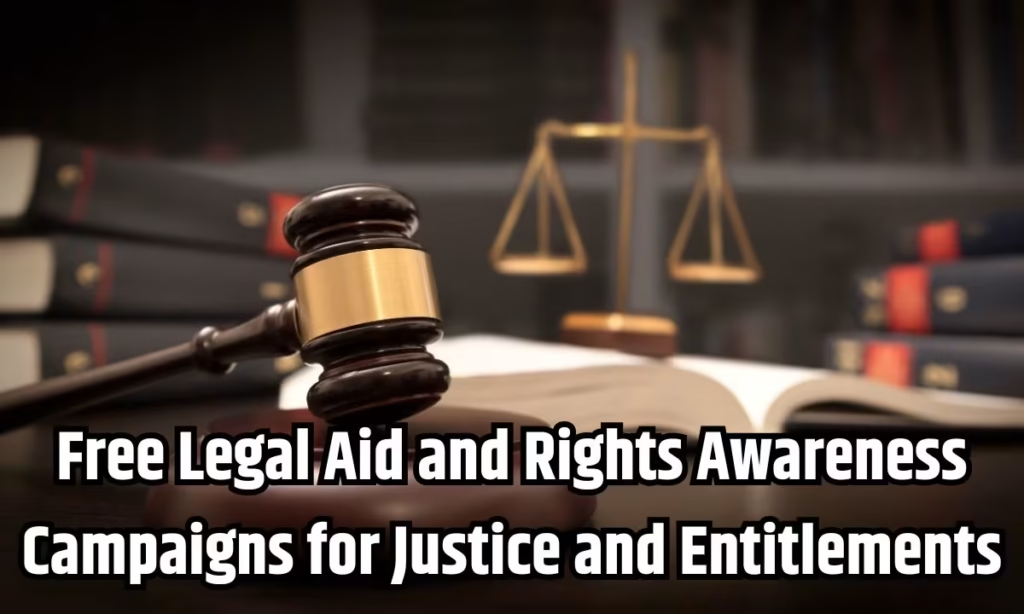Free Legal Aid and Rights Awareness: In a world where justice should be blind, reality often paints a different picture. Imagine a single mother facing eviction because she can’t afford a lawyer, or a low-wage worker denied benefits they’re entitled to simply because they don’t know how to navigate the system. These scenarios aren’t rare—they happen every day to millions of people living in poverty. But there’s hope on the horizon through free legal aid and rights awareness campaigns.
These initiatives are game-changers, educating the poor about their legal rights, providing no-cost consultancy, and helping them claim government entitlements. In this post, we’ll dive deep into how these programs work, their impact, and why they’re essential for building a fairer society. Whether you’re seeking help or looking to make a difference, this guide will equip you with the knowledge to act.
What Is Legal Aid and Why Does It Matter?
Legal aid is essentially free or low-cost legal assistance provided to those who can’t afford traditional lawyer fees. It’s designed to level the playing field, ensuring that everyone—regardless of income—has access to justice. For the underprivileged, this means getting help with civil matters like housing disputes, family issues, employment rights, and more, without the burden of hefty bills.

Think about it: Legal problems don’t discriminate, but the ability to solve them often does. Without aid, a simple landlord-tenant disagreement can spiral into homelessness. Free legal consultancy steps in here, offering advice, representation in court, and even mediation services. Organizations worldwide run these programs, often funded by governments, nonprofits, or volunteer lawyers. In many countries, legal aid covers areas like debt relief, immigration support, and protection from domestic violence.
The importance can’t be overstated. Studies show that when people receive legal help, they’re more likely to resolve issues favorably. For instance, families facing foreclosure might keep their homes, or victims of unfair labor practices could recover lost wages. This not only stabilizes individual lives but also strengthens communities by reducing inequality. Legal aid isn’t just about winning cases; it’s about empowering people to stand up for themselves, fostering self-reliance and dignity.
The Role of Rights Awareness Campaigns
Knowledge is power, especially when it comes to rights. Rights awareness campaigns are targeted efforts to educate vulnerable populations about their legal entitlements. These initiatives use workshops, community outreach, social media, and even door-to-door visits to spread information. The goal? To bridge the gap between laws on paper and real-life application.
For the poor, ignorance of rights can be costly. Many don’t realize they qualify for protections against discrimination, safe working conditions, or access to education. Campaigns simplify complex legal jargon, making it accessible. Picture a rural village where a mobile legal clinic sets up shop, explaining labor laws to farm workers or tenant rights to slum dwellers. These programs often partner with local leaders to build trust and encourage participation.
Successful campaigns go beyond lectures—they incorporate interactive elements like role-playing scenarios or Q&A sessions. In urban areas, digital tools like apps and videos help reach younger audiences. The result is a ripple effect: Educated individuals share knowledge with family and friends, creating a network of informed citizens. Ultimately, these campaigns prevent exploitation and encourage proactive steps, like filing claims for unpaid benefits or reporting abuses.
Key Government Entitlements for Low-Income Families
One of the biggest barriers for the poor is navigating government entitlements—benefits designed to provide a safety net. Free legal aid often helps people understand and access these programs, turning potential aid into actual support. Here’s a breakdown of some common entitlements that can make a huge difference.
First, food assistance programs ensure no one goes hungry. These provide vouchers or direct aid for nutritious meals, helping families stretch their budgets. Health insurance options for low-income groups cover medical visits, prescriptions, and emergencies, preventing debt from illness.
Housing help is another lifeline, offering subsidies for rent or utilities to avoid eviction or energy shutoffs. For families with children, child care subsidies allow parents to work while knowing their kids are safe. Financial aid like temporary cash assistance supports basic needs during tough times, such as job loss.
Education entitlements include scholarships or grants for low-income students, breaking the cycle of poverty. Unemployment benefits provide interim income, while disability support aids those unable to work. Legal consultants play a key role here, assisting with applications, appeals, and ensuring eligibility isn’t overlooked due to paperwork errors.
By claiming these entitlements, families gain stability. A parent might use housing aid to keep a roof over their heads, freeing up funds for education. Awareness campaigns amplify this by teaching how to apply, what documents are needed, and how to appeal denials.
Real-Life Stories of Transformation
Nothing illustrates the power of these programs like real stories. Take Maria, a single mother in a bustling city who was wrongfully denied unemployment benefits after losing her job. Unaware of her rights, she struggled to feed her kids. A local rights awareness workshop changed everything—she learned about appeal processes and connected with a free legal consultant. Within months, she won her case, receiving back payments that stabilized her family.
In another example, a community in a developing region faced rampant land grabs by corporations. A nonprofit launched an awareness campaign, educating residents on property rights and environmental laws. With free legal aid, they filed a collective lawsuit, halting the evictions and securing compensation. This not only protected homes but also inspired neighboring villages to organize.
Or consider elderly pensioners in urban slums who didn’t know about senior entitlements like medical rebates. A door-to-door campaign informed them, and volunteer lawyers helped process claims. The result? Improved health and financial security, reducing reliance on charity.
These stories highlight a common theme: Free legal aid and awareness don’t just solve problems—they empower people to advocate for themselves long-term. From domestic violence survivors escaping abuse to workers claiming fair wages, the impact is profound and far-reaching.
How Free Legal Consultancy Bridges the Justice Gap
The justice gap—the divide between those who can afford lawyers and those who can’t—is widening, but free consultancy is closing it. These services offer one-on-one advice, often through hotlines, clinics, or online portals. For the poor, this means expert guidance without financial stress.
Consultants help with everything from drafting legal documents to representing clients in court. In family law, they assist with custody battles or divorce proceedings. In consumer rights, they tackle scams or unfair contracts. The key is personalization—advisors tailor advice to individual circumstances, considering cultural and language barriers.
Technology is revolutionizing this. Virtual consultations make aid accessible in remote areas, while AI tools provide initial assessments. Partnerships with community centers ensure outreach to the most vulnerable, like immigrants or the disabled.
The benefits extend to society. Resolved legal issues reduce court backlogs and prevent escalation into crimes. Economically, stable families contribute more, boosting local economies. By addressing root causes like poverty-driven disputes, these programs promote peace and equity.
Challenges in Implementing These Programs
Despite their success, challenges persist. Funding shortages limit reach, with many programs relying on donations or grants. In rural areas, access is hindered by distance and lack of internet. Stigma around seeking help can deter participation, especially in conservative communities.
Overworked staff face burnout, and bureaucratic hurdles slow down aid. Language barriers and low literacy levels complicate education efforts. To overcome these, innovative solutions like mobile apps and multilingual materials are emerging. Governments must prioritize funding, while nonprofits collaborate for broader impact.
The future looks promising with growing global recognition. International bodies advocate for expanded legal aid, and tech integrations promise efficiency. By addressing these hurdles, we can ensure no one is left behind.
Ways to Get Involved and Access Help
Want to make a difference? Start by volunteering—lawyers can offer pro bono hours, while non-experts can assist with outreach. Donate to organizations running these programs, or spread awareness through social media.
If you need help, search for local legal aid offices or hotlines. Many offer eligibility checkers online. Attend community workshops to learn rights firsthand. Remember, seeking aid is a strength, not a weakness.
Conclusion
Free legal aid and rights awareness campaigns are more than services—they’re lifelines for the underprivileged. By educating about rights and providing consultancy, they unlock justice and entitlements, transforming lives and communities. From preventing homelessness to securing benefits, the ripple effects are immense. As we move forward, let’s commit to supporting these initiatives. Whether through advocacy, volunteering, or simply sharing knowledge, everyone can play a part. In a truly equitable world, justice isn’t a privilege—it’s a right for all.
FAQ
What is legal aid?
Legal aid is free or affordable legal assistance for people who can’t pay for lawyers, covering civil issues like housing, family, and employment.
How do rights awareness campaigns work?
These campaigns educate through workshops, media, and outreach, teaching vulnerable groups about their legal rights and how to claim them.
Who qualifies for free legal consultancy?
Typically, low-income individuals or families below a certain income threshold qualify, though eligibility varies by location and program.
What government entitlements can low-income families access?
Common ones include food assistance, health insurance, housing subsidies, utility aid, and cash support for basic needs.
How can I find free legal help near me?
Search online for local legal aid organizations, call national hotlines, or visit community centers for referrals.
Are these programs available worldwide?
Yes, many countries have legal aid systems, often run by governments or nonprofits, with global organizations supporting international efforts.
What impact do these programs have on society?
They reduce inequality, prevent poverty escalation, and promote economic stability by ensuring fair access to justice and resources.
